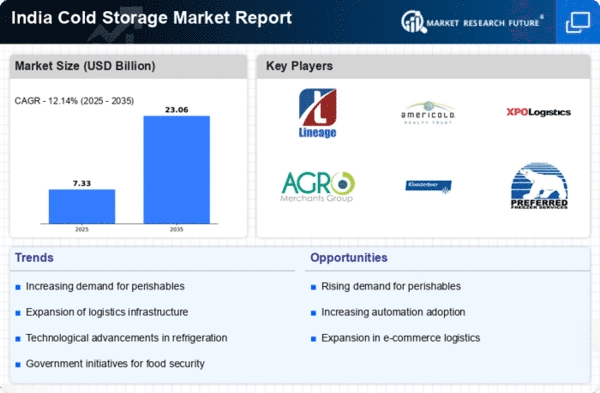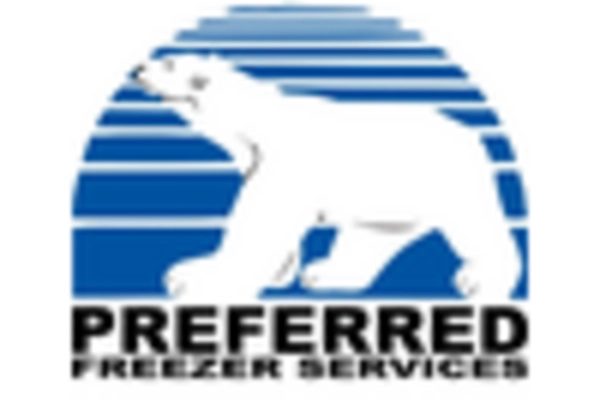Expansion of the Pharmaceutical Sector
The pharmaceutical sector in India is experiencing rapid growth, which is positively influencing the cold storage market. With the increasing production of vaccines, medicines, and biologics, there is a heightened need for temperature-controlled storage solutions to maintain product efficacy. The cold storage market is adapting to these requirements by developing specialized facilities that comply with stringent regulatory standards. The Indian pharmaceutical market is projected to reach $130 billion by 2025, which could lead to a significant increase in demand for cold storage capacity, estimated at around 15% annually. This expansion underscores the critical role of cold storage in ensuring the safe distribution of pharmaceutical products.
Investment in Renewable Energy Solutions
The cold storage market in India is witnessing a shift towards renewable energy solutions, driven by the need for sustainable practices. As energy costs rise and environmental concerns grow, stakeholders in the cold storage market are increasingly investing in solar and other renewable energy sources to power their facilities. This transition not only reduces operational costs but also aligns with government initiatives promoting sustainability. Reports suggest that the adoption of renewable energy in cold storage could lead to a reduction in energy expenses by up to 30%, enhancing the overall profitability of operations. This trend is likely to shape the future of the cold storage market, making it more environmentally friendly and economically viable.
Rising Awareness of Food Safety and Quality
There is a growing awareness among consumers in India regarding food safety and quality, which is significantly impacting the cold storage market. As consumers become more health-conscious, they demand fresher and safer food products, prompting retailers and suppliers to invest in better cold storage facilities. The cold storage market is responding to this trend by implementing advanced technologies and practices to ensure compliance with food safety standards. The Food Safety and Standards Authority of India (FSSAI) has set stringent guidelines for food storage, which has led to an increase in the adoption of cold storage solutions. This heightened focus on food safety is likely to drive market growth by approximately 20% over the next few years as stakeholders prioritize quality assurance.
Increasing Urbanization and Population Growth
The rapid urbanization and population growth in India are driving the cold storage market. As more people migrate to urban areas, the demand for perishable goods, such as fruits, vegetables, and dairy products, increases significantly. This urban shift necessitates efficient storage solutions to minimize spoilage and ensure food security. According to recent estimates, urban areas are expected to house over 600 million people by 2031, leading to a projected increase in cold storage capacity requirements by approximately 30% over the next five years. The cold storage market must adapt to these demographic changes by expanding facilities and improving logistics to meet the rising demand for fresh produce in urban centers.
Growth of E-commerce and Online Grocery Delivery
The surge in e-commerce and online grocery delivery services in India is reshaping the cold storage market. With the increasing preference for online shopping, especially for perishable items, companies are investing in cold chain logistics to ensure product quality during transit. The cold storage market is witnessing a transformation, as businesses seek to establish temperature-controlled warehouses to cater to this growing segment. Reports indicate that the online grocery market in India is expected to reach $18 billion by 2024, which could lead to a corresponding increase in cold storage capacity by around 25% to support the logistics of these services. This trend highlights the necessity for robust cold storage solutions to maintain the integrity of perishable goods.

















